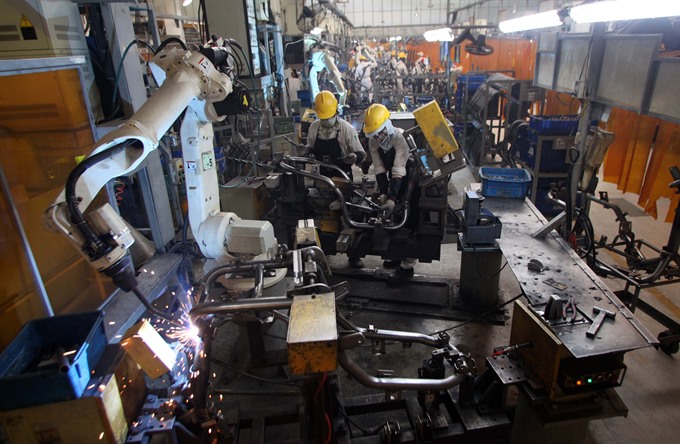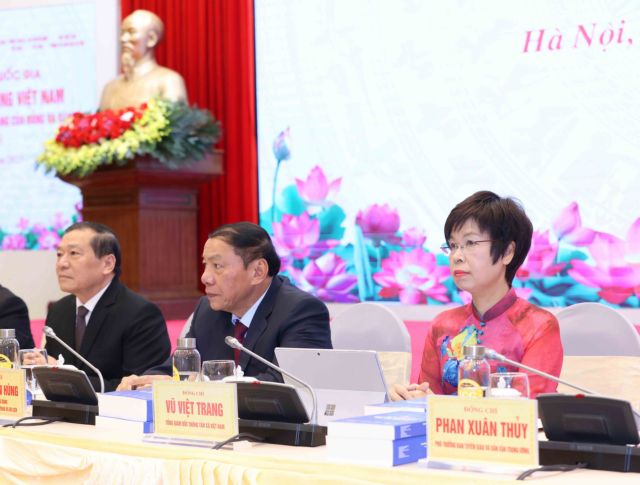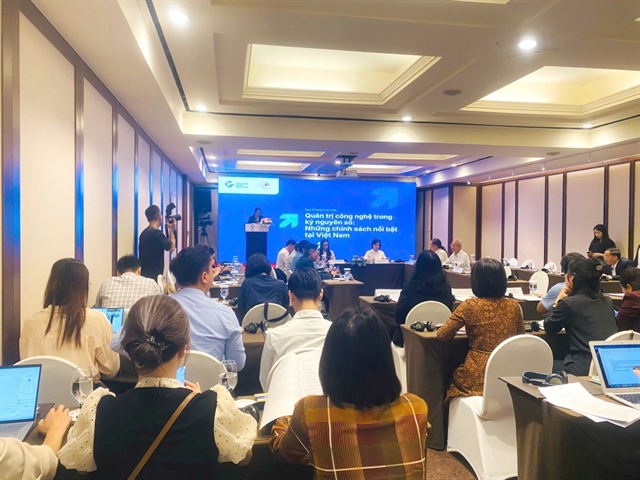 Economy
Economy

According to a survey conducted late last year, 82 per cent of Vietnamese businesses have not taken steps to prepare for the fourth industrial revolution, while just 10 per cent said they were ready, Minister of Industry and Trade Trần Tuấn Anh said during a session themed “Digital market, Global Opportunity” held Thursday as part of the World Economic Forum on ASEAN in Hà Nội.
 |
| Automation technologies used in the Taiwan-invested Precision Việt Nam 1 Co Ltd, a manufacturer of automobile parts, located in Vĩnh Phúc Province. — VNA/VNS Photo Trần Việt |
HÀ NỘI — According to a survey conducted late last year, 82 per cent of Vietnamese businesses have not taken steps to prepare for the fourth industrial revolution (Industry 4.0), while just 10 per cent said they were ready, Minister of Industry and Trade Trần Tuấn Anh said during a session themed “Digital Market, Global Opportunity” held on Thursday as part of the World Economic Forum on ASEAN in Hà Nội.
“One of the significant challenges for the Vietnamese Government is to raise awareness of the business community and of the general public. We cannot let the Vietnamese economy and Vietnamese workers be left behind on the Industry 4.0 journey,” he said.
Minister Tuấn Anh said that the Industry 4.0 has widespread implications, especially in terms of the course of national development and the economic and labour structure.
“According to the industry and trade ministry’s assessment, by 2020, up to 86 per cent and 74 per cent of workers in the two sectors of textiles and footwear, respectively, could lose their jobs. The problem is that these two industries are labour-intensive, employing large number of workers, and have contributed greatly to Việt Nam’s exports and economic growth,” he said.
Bharathi Viswanathan, Chief Information Officer of Coca-Cola’s Asia-Pacific Group, stressed that amid rapid global changes, it’s critical that we should develop in our children “the qualities of curiosity, problem-solving, creativity, interpersonal skills and the ability to deal with changes as they come,” adding that a mindset to continually learn and adopt new skills is a requirement in the digital era.
E-commerce potentials
All panelists in the discussion, however, agreed that e-commerce in Southeast Asian, including Việt Nam, is a promising field.
Gerry A. Mattios, Expert Vice-President of Bain & Company SE Asia Inc, said the digital economy has been gaining steam in the past few years.
Currently, the digital economy only accounts for 7 per cent of ASEAN states’ economies but the figure might grow five to 10 times if proper investment into education, infrastructure and regulatory framework is made.
There is still a lot of room for growth, given a young population ASEAN digital economy still trails behind China’s digital economy shares of 16 per cent in its total GDP or US’ 37 per cent.
In line with the upward trend of e-commerce, Minister Tuấn Anh said Việt Nam’s e-commerce scene has been upbeat in recent years.
In 2014, the value of retail e-commerce in the country reached US$2.97 billion, accounting for a meagre 2.12 per cent of total consumer purchases, but by 2016, the number had reached 3.6 per cent with year-on-year growth of 29 per cent.
It is estimated that by 2020, 30 per cent of the Vietnamese population will participate in online purchasing, with each person spending about $350 a year, raising the Vietnamese e-commerce scope to $10 billion, accounting for 5 per cent of total purchase value, Tuấn Anh said. “Large potential remains and Việt Nam welcome foreign investors into this field.”
But in order to develop the digital economy, the Vietnamese trade minister proposed that ASEAN policy-makers develop digital transformation strategies not only at the national level but also in line with the whole ASEAN region, with emphasis on issues such as enhancing network security and cross-border data flows, mobile finance, enhancing digital reach and developing high-quality human resources in the digital age in collaboration with private sector.
Santitarn Sathirathai, Group Chief Economist of Sea Group, which owns Shopee, one of the most popular e-commerce platforms in ASEAN countries, agrees with minister Tuấn Anh on the need for public-private partnership, citing example of the group’s Shopee university, which is an online workshop programme that has collaborated with Thailand Government in providing training on digital market know-hows for traditional agriproduct sellers.
Toby Edwards, Chief Executive Officer of Shipa Freight, a digital logistics platform based in the United Arab Emirates, expressed his belief that removing trade barriers would be conducive to a thriving digital economy.
“Trade follows the path of least resistance,” he told the participants. “As a country, the easier you make it to do business, the more business you will attract.” — VNS









